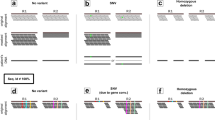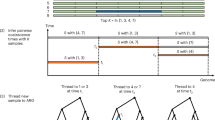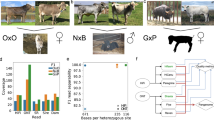Abstract
We previously reported linkage between bipolar disorder and a region on human chromosome (hc) 18q21. to identify genes in this region, exon trapping was performed on cosmids isolated from an hc18-specific cosmid library (ll18nc02) using 47 sequence tagged site (sts) markers from 18q21 as hybridization probes. a total of 285 unique sequences (exons) were obtained from 850 sequenced clones. homology searching of the databases using ncbi's blast algorithms revealed that 31 exons have identity to known genes and/or ests, seven are identical to regions of finished genomic sequences in the 18q21 region, 20 have significant similarity (>30% sequence identity) to genes from human and/or other species, 19 were repetitive sequences, and 208 sequences (72%) are novel. Seventy per cent of the trapped sequences were predicted to be derived from genes using library screening and RT-PCR analyses. This represents an initial stage in characterizing genes in a susceptibility region for further study in bipolar disorder or other diseases that map to this region.
This is a preview of subscription content, access via your institution
Access options
Subscribe to this journal
Receive 12 print issues and online access
$259.00 per year
only $21.58 per issue
Buy this article
- Purchase on Springer Link
- Instant access to full article PDF
Prices may be subject to local taxes which are calculated during checkout

Similar content being viewed by others
References
MacKinnon DF, Jamison KR, DePaulo JR . Genetics of manic depressive illness Ann Rev Neurosci 1997; 20: 355–373
Stine OC, Xu J, Koskela R, McMahon FJ, Gschwend M, Friddle C S et al. Evidence for linkage of bipolar disorder to chromosome 18 with a parent-of-origin effect Am J Hum Genet 1995; 57: 1384–1394
McMahon FJ, Hopkins PJ, Xu J, McInnis MG, Shaw S, Cardon L et al. Linkage of bipolar affective disorder to chromosome 18 markers in a new pedigree series Am J Hum Genet 1997; 61: 1397–1404
Berrettini WH, Ferraro TN, Goldin LR, Weeks DE, Detera-Wadleigh S, Nurnberger JI Jr et al. Chromosome 18 DNA markers and manic-depressive illness: evidence for a susceptibility gene Proc Natl Acad Sci USA 1994; 91: 5918–5921
Freimer NB, Reus VI, Escamilla MA, McInnes LA, Spesny M, Leon P et al. Genetic mapping using haplotype, association and linkage methods suggests a locus for severe bipolar disorder (BPI) at 18q22–q23 Nat Genet 1996; 12: 436–441
Coon H, Hoff M, Holik J, Hadley D, Fang N, Reimherr F et al. Manic depression, chromosome 1, linkage analysis. Analysis of chromosome 18 DNA markers in multiplex pedigrees with manic depression Biol Psychiatry 1996; 39: 689–696
DeBruyn A, Souery D, Mendelbaum K et al. Positive linkage results with 18q21.33–q33 markers in a bipolar II family [Abstract] Psychiatr Genet 1995; 5: (Suppl1) S16
Dorr DA, Rice JP, Armstrong C, Reich T, Blehar M . A meta-analysis of chromosome 18 linkage data for bipolar illness Genet Epidemiol 1997; 14: 617–622
Nothen MM, Cichon S, Rohleder H, Hemmer S, Franzek E, Fritze J et al. Evaluation of linkage of bipolar affective disorder in a sample of 57 German families Mol Psychiatry 1999; 4: 476–484
Risch N, Merikangas K . The future of genetic studies of complex human diseases Science 1996; 273: 1516–1517
Buckler AJ, Chang DD, Graw SL, Brook JD, Haber DA, Sharp PA et al. Exon amplification: a strategy to isolate mammalian genes based on RNA splicing Proc Natl Acad Sci USA 1991; 88: 4005–4009
Chen H, Chrast R, Rossier C, Morris MA, Lalioti MD, Antonarakis SE . Cloning of 559 potential exons of genes of human chromosome 21 by exon trapping Genome Res 1996; 6: 747–760
Discovery Manager software version 2 . 2 Genomica Corporation, Boulder, CO 2000
Altschul SF . Amino acid substitution matrices from an information theoretic perspective J Mol Biol 1991; 219: 555–565
Gyapay G, Schmitt K, Fizames C, Jones H, Vega-Czarny N, Spillett D et al. A radiation hybrid map of the human genome Hum Mol Genet 1996; 5: 339–346
Trofatter JA, Long KR, Murrell JR, Stotler CJ, Gusella JF, Buckler AJ . An expression-independent catalog of genes from human chromosome 22 Genome Res 1995; 5: 214–224
Pirozzi G, McConnell SJ, Uveges AJ, Carter JM, Sparks AB, Kay BK et al. Identification of novel human WW domain-containing proteins by cloning of ligand targets J Biol Chem 1997; 272: 14611–14616
Tu IP, Whittemore AS . Power of association and linkage tests when the disease alleles are unobserved Am J Hum Genet 1999; 64: 641–649
Acknowledgements
This study is supported by the Theodore and Vada Stanley Foundation; NIH grants to CAR (MH50763), MGM (MH01088) and JRD (MH42243); and National Alliance for Research on Schizophrenia and Depression (NARSAD) grant (JRD, MGM). We thank Drs Russell L Margolis and Virginia Willower for critical reading of the manuscript. We also thank Dr Russell L Margolis and John Kleiderlain for providing us with a set of filter lifts of a cerebellum cDNA library, and Drs OC Stine and A Heinzer for YAC contig construction.
Author information
Authors and Affiliations
Corresponding authors
Additional information
Accession numbers for the sequences submitted to GenBank are AF149426–AF149699
Rights and permissions
About this article
Cite this article
Chen, H., Huo, Y., Patel, S. et al. Gene identification using exon amplification on human chromosome 18q21: implications for bipolar disorder. Mol Psychiatry 5, 502–509 (2000). https://doi.org/10.1038/sj.mp.4000780
Received:
Revised:
Accepted:
Published:
Issue Date:
DOI: https://doi.org/10.1038/sj.mp.4000780
Keywords
This article is cited by
-
Trapping and sequence analysis of 1138 putative exons from human chromosome 18
Molecular Psychiatry (2003)
-
NEDD4L on human chromosome 18q21 has multiple forms of transcripts and is a homologue of the mouse Nedd4-2 gene
European Journal of Human Genetics (2001)



